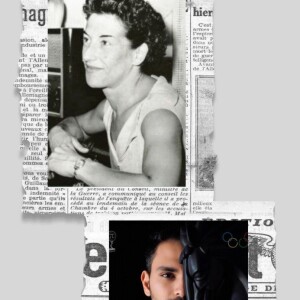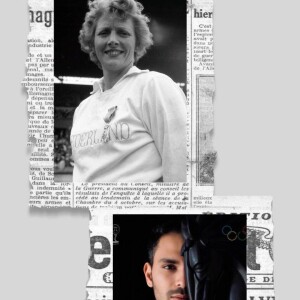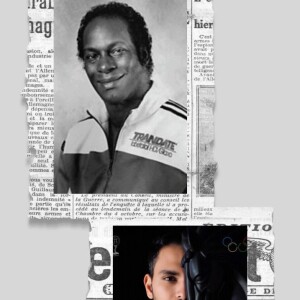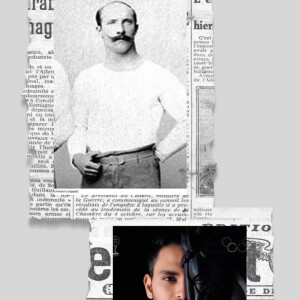Professor P with Dr.Peykar
Dr.Parsa Peykar, a psychologist, university professor and author, shares through the episodes lessons on leadership, influence and service. Each episode is like a ”mini-research” which answers the ”Research question” related to the topic and will be divided into three parts: 1-A book review/ Art analysis. 2- A podcast with an influential person. 3- University student’s feedback on the topic. One theme is common among all episodes: All the guests suggest at least one act of kindness for listeners to do. The Professor P Podcast acts as a fun, engaging ”university” which tends to bring both educational and experimental lessons to each listener and help them to be influential figure in their chosen field! Also, it exists to add value to its follower’s lives and encourage them to add value to others. Please reach out to us for comments or by simply saying hi: contact@parsapeykar.com
Episodes

6 days ago
6 days ago
Beach volleyball isn’t just about skill—it’s about mental resilience, adaptability, and trust. In this episode, Austrian Olympian Robin Seidl takes us inside his world, from the high-pressure courts of the 2016 Rio Olympics to the philosophy that drives his game: Inner Freedom.
How does an elite athlete handle setbacks? What does it take to perform when the world is watching? Robin shares how he stays mentally sharp, embraces uncertainty, and continuously evolves, both as a competitor and a mentor. Whether you’re an athlete, entrepreneur, or simply chasing your own version of success, Robin’s insights will challenge you to trust yourself, let go of fear, and play to win—on and off the court.
----------
Robin Seidl is a professional Austrian beach volleyball player who has competed at the highest levels of international volleyball, including the Olympic Games. Known for his agility, strategic gameplay, and resilience, he has made a significant mark on the sport.
Seidl has been a regular on the FIVB Beach Volleyball World Tour, competing against the world's best athletes and securing multiple podium finishes. His career highlight includes representing Austria at the 2016 Rio Olympics, showcasing his skill and determination on the global stage.
Beyond competing, Seidl is passionate about mentorship, personal growth, and mental resilience. He believes in the philosophy of "Inner Freedom", emphasizing mindset, self-trust, and adaptability as key factors for success in both sports and life.

Saturday Jun 14, 2025
Saturday Jun 14, 2025
What does it mean to find grace after grief, to pursue excellence beyond expectation, and to dance into old age with joy? In this episode, we explore the extraordinary life of Ágnes Keleti, Holocaust survivor, Olympic legend, and timeless teacher. From redefining age and artistry in gymnastics to her philosophy of life after 100, Keleti’s story is a powerful reminder that the human spirit—when filled with grace and grit—can illuminate the darkest of times. Discover how her legacy can inspire you to move with purpose, live with joy, and teach with love.
---------------------------------------------------------
Ágnes Keleti was a Hungarian-Israeli gymnast, teacher, and one of the most inspiring Olympic champions in history. Born in Budapest in 1921 to a Jewish family, her early life was marked by talent, discipline, and the rising threat of World War II. She survived the Holocaust by assuming a false identity and going into hiding—losing many family members in the process. Despite these unimaginable hardships, Keleti resumed training after the war and, in a stunning display of resilience and determination, went on to become one of the most decorated female Olympians, earning 10 medals (including 5 golds) at the 1952 and 1956 Olympic Games—all while in her 30s, defying the norms of her sport.
After the Soviet invasion of Hungary in 1956, she chose not to return home and instead built a new life in Israel, where she became a beloved coach, educator, and advocate for women's physical education. Beyond her athletic brilliance, Keleti was known for her optimism, warmth, and her deeply human spirit. She lived past 100 years old, often reminding others, “Life is beautiful if you make it beautiful.” Her life is not only a record of triumph in sport but also a profound testimony to endurance, renewal, and the power of choosing joy despite suffering.
---------------------------------------------------------
FUN FACT: During World War II, Ágnes Keleti survived the Holocaust by assuming a false identity and working as a maid in the Hungarian countryside. Her father and many relatives were killed in Auschwitz, but Keleti endured and returned to gymnastics after the war. Despite missing what would’ve been her first Olympics in 1948 due to injury, she came back stronger proving that resilience and grace can triumph over even the darkest of histories.
![OLYMPIC SERIES Episode 6 | Emma Maltais: The Olympic Mindset – Grit, Gold, and Greatness [TEAM CANADA]](https://pbcdn1.podbean.com/imglogo/ep-logo/pbblog16591242/IMG_9045_300x300.jpg)
Saturday Jun 07, 2025
Saturday Jun 07, 2025
What does it take to reach the pinnacle of women’s hockey and win Olympic gold? In this episode, we sit down with Emma Maltais, Team Canada forward and Olympic gold medalist, to explore the relentless drive, resilience, and mental toughness required to compete on the world’s biggest stage. From her early days in Burlington, Ontario, to excelling at Ohio State University and earning a place on the Olympic roster, Emma shares her journey, the sacrifices behind the success, and the lessons she’s learned along the way. How do elite athletes stay mentally strong under pressure? What fuels the pursuit of greatness beyond the gold medal? Join us for an inspiring conversation about the Olympic mindset, overcoming obstacles, and paving the future of women's hockey.
----------
Emma Maltais is an Olympic gold medalist and a standout forward for Team Canada. Known for her speed, relentless work ethic, and elite playmaking ability, Maltais has made a name for herself on both the international stage and in professional women’s hockey.
Her rise to prominence began at Ohio State University, where she was a dominant force in the NCAA. She earned multiple accolades, including:
WCHA Rookie of the Year (2017-18)
Top 10 Finalist for the Patty Kazmaier Memorial Award (2020)
Three-time First Team All-WCHA Selection
Her impact extended beyond college hockey as she transitioned into international play, competing for Team Canada at the highest level:
IIHF U18 Women’s World Championship (2016 & 2017): Won two silver medals.
2021 IIHF Women’s World Championship: Helped Canada secure gold.
2022 Winter Olympics (Beijing): Played a key role in Canada’s gold medal-winning campaign, contributing to the team’s dominant run.
In 2023, Maltais took her talents to professional hockey, signing with Toronto in the PWHL, further solidifying her status as one of the brightest stars in women’s hockey.

Saturday May 31, 2025
Saturday May 31, 2025
In this inspiring episode, we explore the remarkable life of Fanny Blankers-Koen—the Dutch sprinter who redefined what it means to be a woman in sports. At a time when female athletes were often discouraged, dismissed, or ignored—especially after marriage and motherhood—Blankers-Koen proved that passion, discipline, and talent have no expiration date.
At the 1948 London Olympics, at age 30 and a mother of two, she sprinted her way into history, winning four gold medals and earning the nickname “The Flying Housewife.” But her story goes far beyond medals. It's a tale of quiet rebellion, unwavering focus, and a legacy that still challenges our assumptions about age, gender, and ambition.
Join us as we dive into the mindset that fueled her record-breaking runs, the societal barriers she leapt over, and the practical ways her life story can inspire our own—whether on the track, in the boardroom, or at home.
---------------------------------------------------------
Fanny Blankers-Koen (1918–2004) was a Dutch track and field legend who stunned the world at the 1948 Olympic Games by winning four gold medals in the 100m, 200m, 80m hurdles, and 4x100m relay—all while being 30 years old and a mother of two. Known as "The Flying Housewife," she shattered outdated expectations of women in athletics and became a symbol of resilience, grace, and determination. In a post-war era when many believed a woman’s place was at home, she ran against that current—literally and metaphorically—becoming the first female athlete to show the world that motherhood and elite performance are not mutually exclusive. Named the IAAF's “Female Athlete of the Century” in 1999, her legacy continues to inspire athletes and advocates across generations.
---------------------------------------------------------
FUN FACT: Fanny Blankers-Koen actually set or tied 12 world records in her career—not just in sprinting, but also in events like the high jump, long jump, and even the hurdles. She was a true all-around athlete, basically a one-woman track team!
![OLYMPIC SERIES Episode 5 | Racing the Edge: Kyle Evans on BMX, Fearlessness, and the Mental Game of Speed [TEAM GREAT BRITAIN]](https://pbcdn1.podbean.com/imglogo/ep-logo/pbblog16591242/IMG_265D364DE9E3-1_300x300.jpeg)
Saturday May 24, 2025
Saturday May 24, 2025
"It’s super important to put your goals out into the world by speaking them out loud—and even more so, to write them down and place them in an environment where you can see them every day." Kyle Evans
What does it take to compete at breakneck speeds, make split-second decisions, and push past fear on the world’s biggest stage? In this episode of Professor P Podcast, we sit down with Kyle Evans, British BMX champion and Olympian, to dive deep into the mental and psychological side of elite racing.
Kyle shares his journey from local tracks to the Olympic Games, revealing how he developed the mental toughness, focus, and resilience needed to excel in one of the world’s most intense sports. We explore:🔹 The psychology of speed—how to stay in control when everything is moving at lightning pace🔹 Overcoming fear and doubt when every race is high-stakes🔹 How he dealt with injuries, setbacks, and the pressure of elite competition🔹 The transition from athlete to mentor—what he’s teaching the next generation of BMX riders
Whether you're an athlete, entrepreneur, or someone chasing bold goals, this conversation will challenge you to embrace risk, trust your instincts, and build a champion’s mindset.
----------
Kyle Evans is a British BMX racer known for his explosive speed, fearless riding style, and relentless pursuit of excellence. Born on September 26, 1993, in Wigan, England, Evans quickly rose through the ranks of British BMX racing, earning a reputation as one of the country’s top riders.
His breakthrough came when he represented Great Britain at the 2016 Rio Olympics, showcasing his talent on the world’s biggest stage. Throughout his career, he has competed in multiple UCI BMX World Championships and played a pivotal role in Team GB’s success in international competitions.
Some of his key achievements include:
2018 European BMX Champion, securing gold in the men’s elite category
Multiple-time British BMX Champion, dominating the national circuit
Key member of Great Britain’s BMX program, helping to develop the sport for future generations
Evans’ career has been defined by resilience and mental toughness, qualities essential in a sport where split-second decisions can mean the difference between victory and defeat. After retiring from competitive racing, he has remained deeply involved in BMX, coaching and mentoring young riders, as well as advocating for the psychological and physical aspects of elite performance.
With a career built on determination, adaptability, and a fearless competitive mindset, Kyle Evans continues to inspire the next generation of athletes—on and off the track.

Saturday May 17, 2025
Saturday May 17, 2025
Today, we're diving into the story of a man whose name became synonymous with the impossible—Bob Beamon. Born in South Jamaica, Queens, in 1946, Beamon faced tough circumstances from a young age. He lost his mother when he was just a child and was raised by his grandmother. Growing up in a rough neighborhood, sports became more than just a pastime—it became a lifeline. It was in high school that Beamon discovered his raw talent for track and field, especially the long jump.
His athletic gifts earned him a scholarship to the University of Texas at El Paso, where he continued to train and compete. But it was at the 1968 Mexico City Olympics that Bob Beamon etched his name into history. In a moment that stunned the world, he launched himself into the air for a jump of 8.90 meters, or 29 feet, 2½ inches. That single leap broke the existing world record by an astonishing 55 centimeters—over 21 inches. To give you a sense of how unheard of that was, even the measuring device at the time wasn’t prepared for a jump that long.
The term "Beamonesque" was born that day—used ever since to describe athletic achievements that defy belief. While high altitude and a favorable wind may have helped, nothing could diminish the sheer brilliance of that moment. Beamon’s world record would stand untouched for 23 years, until Mike Powell finally surpassed it in 1991.
After the Olympics, Beamon didn’t chase records. Instead, he completed his education at Adelphi University and turned toward giving back—working as a motivational speaker, sports administrator, and youth advocate. He was inducted into the National Track and Field Hall of Fame in 1977 and remains a symbol of human potential.
Bob Beamon’s story is a powerful reminder that in one moment—one leap—we can redefine what’s possible. His Olympic jump wasn’t just a record—it was a revolution.
---------------------------------------------------------
Bob Beamon is a former American track and field athlete whose name became synonymous with greatness after his unforgettable performance at the 1968 Mexico City Olympics. In a single, gravity-defying moment, Beamon leapt 8.90 meters (29 feet 2½ inches) in the long jump—breaking the world record by an astonishing margin and creating what many call the greatest single leap in sports history. The jump was so far beyond what anyone thought possible that it gave rise to the term “Beamonesque,” meaning a performance so extraordinary it defies comparison. Born and raised in Queens, New York, Beamon overcame a difficult childhood and racial injustice to become a symbol of perseverance and excellence. After retiring from competition, he turned his focus to education, youth empowerment, and motivational speaking, continuing to inspire generations long after his historic jump.
---------------------------------------------------------
FUN FACT: Before his historic jump at the 1968 Olympics, Bob Beamon almost didn’t get the chance to compete—he was nearly disqualified during the qualifying round after fouling his first two jumps. On his final attempt, he played it safe just to make the final. The next day, he unleashed one of the greatest performances in sports history. That dramatic turnaround—from the brink of elimination to immortality—makes his story one of the most inspiring underdog moments in Olympic history.
![OLYMPIC SERIES Episode 4 | Bullseye Mindset: Yasemin Ecem Anagöz on Focus, Pressure & the Psychology of Winning [TEAM TURKIYE]](https://pbcdn1.podbean.com/imglogo/ep-logo/pbblog16591242/IMG_8575_300x300.jpg)
Saturday May 10, 2025
Saturday May 10, 2025
“Before you see it in reality, you need to be there in your mind” Yasemin Ecem Anagöz
What does it take to stay laser-focused when everything is on the line? In this episode of Professor P Podcast, we sit down with Yasemin Ecem Anagöz, one of the world’s top recurve archers, to explore the mental game behind elite performance. From making her Olympic debut at just 18 to navigating the highs and lows of competition, Yasemin shares her journey of resilience, focus, and purpose.
We dive into:🔹 The psychological strategies she uses to stay calm under pressure🔹 How she overcame setbacks and redefined success in her career🔹 The importance of mental training in achieving peak performance🔹 What archery teaches us about discipline, patience, and self-mastery
Whether you're an athlete, entrepreneur, or someone striving for personal growth, this conversation will challenge you to rethink how you approach pressure, failure, and success. Tune in for a masterclass on the mindset of a champion.
----------
Yasemin Ecem Anagöz is a Turkish recurve archer known for her precision, resilience, and mental toughness on the international stage. Born on October 14, 1998, in İzmir, Turkey, she took up archery in 2011 and quickly emerged as one of Turkey’s most promising athletes in the sport.
By the age of 18, Anagöz made her Olympic debut at the 2016 Rio Games, marking the beginning of her journey as a world-class competitor. She later competed at the 2020 Tokyo Olympics, where she and her teammate Mete Gazoz came close to a podium finish, securing fourth place in the mixed team event.
Throughout her career, she has amassed numerous accolades, including:
Gold Medal at the 2018 European Archery Championships (Individual Recurve)
Gold Medal in the Women's Team Event at the 2018 European Championships
Bronze Medal at the 2021 World Archery Championships (Mixed Team with Mete Gazoz)
Silver Medal at the 2022 European Archery Championships (Women’s Team)
Anagöz is known not only for her skill with a bow but also for her mental strength and psychological preparation, which have played a crucial role in her performances. Her ability to stay composed under extreme pressure has made her a standout competitor in a sport where focus and emotional control are everything.
Beyond her career as an athlete, she is also a mental coach, helping others develop the mindset necessary to succeed in high-stakes environments. She serves as a member of the International Committee of Mediterranean Games (ICMG) Commission and continues to advocate for the mental and emotional aspects of peak performance.
With a career defined by discipline, perseverance, and an unwavering commitment to growth, Yasemin Ecem Anagöz stands as a model of resilience and mental excellence in the world of elite sports.

Saturday May 03, 2025
Saturday May 03, 2025
"If you fail to prepare, you’re prepared to fail. Success is not about luck; it’s about having the right mindset, the right effort, and the resilience to keep going even when it gets tough." Mark Spitz
Mark Spitz didn’t just win—he dominated. With seven gold medals in the 1972 Olympics, each in world-record time, he became a legend in swimming and sports history. But his journey wasn’t just about natural talent; it was about relentless preparation, overcoming setbacks, and performing under immense pressure. How did he achieve such dominance? What lessons can we take from his mindset and work ethic? In this episode, we dive deep into the life and legacy of Mark Spitz, uncovering the principles that made him one of the greatest athletes of all time.
---------------------------------------------------------
Mark Spitz is an American former competitive swimmer and one of the most decorated Olympians in history. Born on February 10, 1950, in Modesto, California, Spitz rose to fame during the late 1960s and early 1970s as a dominant force in swimming.
Spitz made his Olympic debut at the 1968 Mexico City Games, where he won two gold medals in relay events, along with a silver and a bronze in individual races. However, it was at the 1972 Munich Olympics that he cemented his legacy, achieving a historic feat—winning seven gold medals in a single Olympic Games, each in world record time. This record stood for 36 years until Michael Phelps surpassed it in 2008.
Beyond his Olympic success, Spitz won nine Olympic gold medals, one silver, and one bronze, along with multiple world and national championships. His powerful butterfly and freestyle strokes, combined with his confident personality, made him one of the first globally recognized swimming superstars.
After retiring from competitive swimming at just 22 years old, Spitz pursued a career in business, acting, and motivational speaking. He remains an influential figure in sports history, embodying excellence, discipline, and the pursuit of greatness. His story continues to inspire generations of athletes, proving that records may be broken, but legends never fade.
---------------------------------------------------------
FUN FACT: Mark Spitz’s iconic mustache was unusual for swimmers at the time, as most athletes shaved their body hair for speed. When asked about it, Spitz jokingly claimed that the mustache made him more hydrodynamic by channeling water away from his mouth. Soviet swimmers, believing he had discovered a competitive advantage, started growing mustaches themselves. Despite the myth, Spitz dominated the 1972 Olympics, proving that his speed had nothing to do with facial hair!
![OLYMPIC SERIES Episode 3 | The Journey of Hadi Tiranvalipour: Fighting for More [TEAM REFUGEE]](https://pbcdn1.podbean.com/imglogo/ep-logo/pbblog16591242/IMG_8112_300x300.jpg)
Saturday Apr 26, 2025
Saturday Apr 26, 2025
“For any goals there are obstacles, but you will find the solution when you stop giving your excuses”Hadi Tiranvalipour
In this compelling episode of The Professor P Podcast’s Olympian Series, we sit down with Hadi Tiranvalipour, a taekwondo athlete who has fought not just in the ring, but also through incredible life challenges to reach the Olympic stage. As a member of the Refugee Olympic Team, Hadi’s journey is about much more than sport—it’s about resilience, hope, and the pursuit of a dream despite overwhelming odds.
Taekwondo is known for its precision, strategy, and discipline, but what does it take to step onto the mat at the world’s biggest competition when your path has been anything but ordinary? We’ll explore the mindset of a fighter, the emotional and physical battles he has faced, and what his journey can teach us about perseverance in all areas of life.
Join us as we break down the fight beyond the fight—where strength isn’t just about power, but about the will to keep going.
----------
Hadi Tiranvalipour is an Iranian-born taekwondo athlete whose journey from national champion to Olympic refugee competitor is a testament to resilience and determination. Born on March 21, 1998, in Karaj, Iran, Hadi was inspired by Olympic gold medalist Hadi Saei and joined the Iranian national taekwondo team, where he competed for eight years, earning multiple national and international accolades.
In 2022, after advocating for women's rights in Iran, Hadi was compelled to leave his homeland. Arriving in Italy, he faced significant hardships, including spending his first ten days living in a forest and subsequent months couch-surfing and working as a dishwasher. Undeterred, he reached out to the Italian Taekwondo Federation, which welcomed him, allowing him to train with the national team at the Giulio Onesti Olympic Center in Rome.
Hadi's perseverance led him to represent the IOC Refugee Olympic Team at the Paris 2024 Summer Olympics in the men's 58kg taekwondo category. Although he did not secure a medal, his participation was a significant milestone, symbolizing hope and the unyielding spirit of displaced athletes worldwide.
Beyond his athletic pursuits, Hadi achieved academic success by earning a degree in Sports Science from the University of Tor Vergata in Rome. His story exemplifies the transformative power of sport and education in overcoming adversity.
Today, Hadi Tiranvalipour stands as a beacon of inspiration, demonstrating that with unwavering determination, it's possible to rise above challenges and make a profound impact both on and off the mat.

Saturday Apr 19, 2025
Saturday Apr 19, 2025
"Strength is not just in the body—it is in the will to keep going, to fight beyond exhaustion, and to rise even when victory seems distant." Carl Schuhmann
What does it take to be a champion in not just one, but multiple sports? Carl Schuhmann, one of the greatest athletes of the first modern Olympics, proved that true greatness lies in versatility, resilience, and an unbreakable will. In this episode, we dive into the life of the German gymnast-wrestler who dominated the 1896 Games, setting a standard for generations of athletes. How did he push the limits of human endurance? What lessons can we learn from his legacy? Join us as we explore the incredible story of a man who defined the Olympic spirit!
---------------------------------------------------------
Born in 1869 in Münster, Germany, Carl Schuhmann was a natural athlete with exceptional strength and agility. He gained fame as a gymnast and later expanded into wrestling. At the 1896 Olympic Games in Athens, he won gold medals in three gymnastics events and one in wrestling, making him one of the most successful athletes of the first modern Olympics. His ability to excel in vastly different disciplines made him a legendary figure in sports history. Schuhmann remained active in sports long after his Olympic triumphs and continued to inspire athletes until his passing in 1946.
---------------------------------------------------------
FUN FACT: Carl Schuhmann was the most successful athlete of the first modern Olympic Games in 1896, winning four gold medals in two different sports—gymnastics and wrestling. Despite being only 5'5" (165 cm) tall and weighing just 140 lbs (64 kg), he defeated much larger opponents in wrestling, including a final match that lasted over 40 minutes. His versatility and dominance helped set the stage for future multi-sport Olympians.








